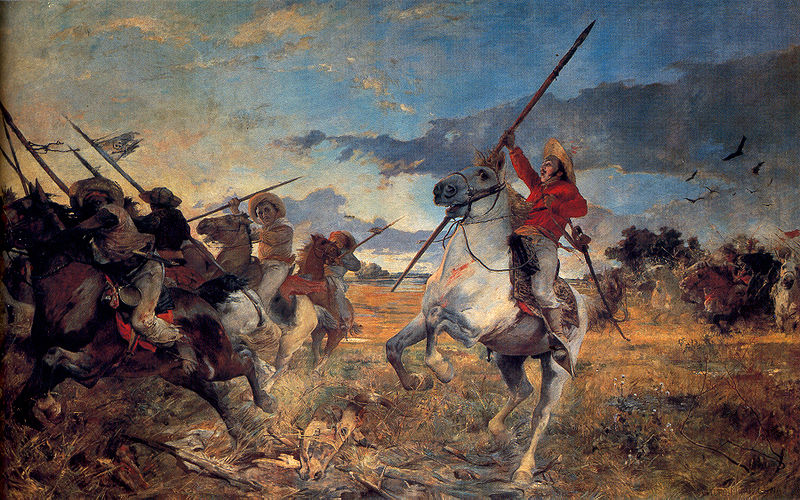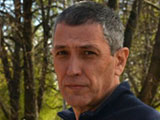Ungovernable for Us: Part II
by Israel Centeno and translated by Kelly Harrison. / February 27, 2014 / No comments
A history of violence in Venezuela—bloodshed and cruelty, past and present.

Vuelvan Caras, painting by Arturo Michelena, depicting an episode of the Battle of Las Queseras del Medio. Photo: Wikimedia Commons.
A while back, I read an essay by Francisco Herrera Luque on violence in Venezuela, which attempts to explain the country’s high crime rates by referring back to the times of the Spanish conquest. It works on the idea that those who came to “civilize us” were, to a large extent, people who had been exiled—criminals and outcasts. They weren’t the great men of the Golden Age, but those who had been excluded from Catholic Spain, those who had no place in the hierarchy being established throughout Europe, the last Roman empire, the sacrosanct bastion of Catholicism. Those who were excluded brought their scourges with them, the things that had dehumanized them during the Roman revival in Madrid.

- From his lonely watch post Albert Camus asked who among us has not experienced exile yet still managed to preserve a spark of fire in their soul. “We’re all alone,” Natalia Sedova cried in exile on hearing of her husband Leon Trotsky’s affair with Frida Kahlo. In his novel Night Watch, Stephen Koch follows the incestuous love affair of David and Harriet, wealthy siblings watching the world from their solitary exile. Koch’s writing, Camus’s theories, and Trotsky’s affair all come back to exile and lead me to reflect on the human condition. From my own vantage point, my Night Watch, I will reflect on my questions of exile, writing, and the human condition.

- Israel Centeno was born in 1958 in Caracas, Venezuela, and currently lives in Pittsburgh as a Writer-in-Residence with City of Asylum/Pittsburgh. He writes both novels and short stories, and also works as an editor and professor of literature. He has published nine books in Venezuela and three in Spain.
According to Herrera Luque in Los Viajeros de Indias, these men without assets, who’d been stripped of all their dignity and land, transferred their resentment, their reactive responses to the harsh reality of life, and their difficulties in recognizing themselves as part of any race, lineage, or class, to the new world. Simply, they were hungry for anything that would restore their dignity and integrate them into the world from which they had been expelled: Gold, power, or violent crime. This would be achieved by the strongest, most able man, the greatest law-breaker, someone who, on behalf of all the outcasts, would spit in the faces of those who had banished them. They were bandits, poorly behaved soldiers, misers of all kinds, traffickers; the descendants of Cain, bearing his mark.
Through these conclusions, as I recall, Herrera Luque attempts to explain one form of violence, a form of violence for which, in those early years, at the end of the 1960s, there were already alarming statistics. He compares Venezuelan violence to Salvadoran violence, two nations with similar demographic characteristics and similar displays of cruelty in their acts of violence.
I will now attempt to change the direction of the discourse in a slight and indiscernible way. I shall look once more to history, but instead develop an idea. In our nations the civil-military concept has always been present at moments of historical change. Let us consider the Patriotic Society of Caracas, who forced the Declaration of Independence. The society was made up of landowners’ sons, all military colonels who had lived in Europe and were influenced by the cruel and idealistic Jacobins of the French Revolution and by Napoleon Bonaparte’s accession, conquests, and triumphs against kings anointed by divine right.
Some budding intellectuals and young gentlemen of high society from the city at the centre of the Captaincy General were the most radical, imposing criteria, based on the idea of the Cortes, in defense of the usurped rights of Ferdinand VII. “Are not three hundred years of calm enough?” exclaimed the young colonel, Simon Bolívar. Thus he rose against the peace of the Spanish order, which had made his own family prosperous over a long period of time. He would go on to break apart this institution without being entirely certain about what the institutions that would reunite the newly independent nations would involve. He had a few romantic notions, as referred to in the discourse of Angostura , based upon the model of the liberal republics of North America and the experiences of the French.
We must take a brief look at these realities in order to understand the present day. Willpower backed by weapons and the will of a civil élite embodies independence from Spain. At least in Venezuela, it was achieved by a minority who ostracized the faceless multitudes, an amalgam of people who did not feel represented by their liberators, including various groups who were excluded from the patriotic project: Blacks, people of mixed-race such as the pardos and zambos , Canary Islanders, and peninsular Spanish (derogatorily referred to as blancos de orilla by their liberators). These marginalized groups rose up in arms against their redeemers and were humanized once more, holding the fanatical bias that characterized the outcasts towards caudillos and strong men who, in the name of Spain, managed to vanquish the liberal landowners and, with neither homeland nor king, would secure the reign of chaos for years to come.
The Venezuelan War of Independence thus became a civil war, a war between people of the same country, in an anarchic and cruel situation that claimed the lives of two thirds of the population. We were born into this reality, we came from this reality, and, as independent republics, bearing the cross of ash on our foreheads, we are unable to escape the violence or set up governments that can guarantee long-lasting peace. We spent the 19th century in this reality, caught between revolts and guerrilla fighters, banditry, and the self-centered ambitions for power of heirs to independence, always using the name of the Liberator to wash away the bloodstains of barbarities.




